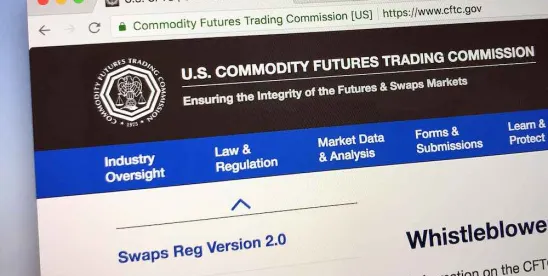On 27 August 2024, a Swiss commodity trader entered into a settlement agreement for $48 million with the US Commodity Futures Trading Commission (“CFTC”) in relation to alleged market manipulation charges. This case, rooted in trading by a Swiss entity in European markets, underscores the CFTC’s expansive interpretation and enforcement of its anti-manipulation powers.
Facts
In March 2018, the company, through its trading desk in Switzerland, allegedly attempted to make several trades in physical EBOB (a refined gasoline product primarily used in Europe) at a discount to indicative bids made by buyers in the market. These sales at a discount were allegedly attempted while the commodity trader held a large short position in EBOB-linked futures contracts on ICE Futures Europe (“ICE Futures Europe”) and the New York Mercantile Exchange (“NYMEX”). The volume-weighted average price of the physical sales of EBOB, as reflected in the Argus EBOB Benchmark, is a factor in determining the settlement price of the related futures contracts.
The company was accused of attempting to sell physical EBOB at prices lower than buyers were willing to pay with an aim to depress the Argus EBOB Benchmark. This strategy was allegedly designed to enhance the company’s short position in EBOB-linked futures by depressing the futures settlement prices and thereby potentially increase the company’s trading profits.
While this matter settled without the respondent admitting or denying the CFTC’s findings and conclusions, it remains particularly interesting for Commissioner Pham’s vociferous dissenting statement, which criticises the CFTC’s understanding of the market it is regulating and the fairness and merits of the ultimate decision.
Comment
The case is an important reminder of the CFTC’s expansive assertion of its jurisdiction. The company is a Swiss subsidiary of a European parent. The relevant physical market is wholly European. The ICE Futures Europe contracts are regulated by the UK Financial Conduct Authority. All the trading activity occurred from Europe. There was no alleged appreciable effect on any market prices and no alleged harm to any third parties. Notably, none of the alleged attempted physical sales were within US interstate commerce, normally a necessary element for CFTC jurisdiction. The only apparent “hook” for CFTC involvement was that the respondent’s futures contracts were on NYMEX, a CFTC-registered designated contract market, and ICE Futures Europe, a CFTC-registered foreign board of trade. As Commissioner Pham’s dissent alludes to, these circumstances at least raise a question about the public purpose of using CFTC enforcement powers to prosecute European-centric activity that had no US price effects.
The case also highlights how little must be established for a finding that a “manipulative device” has been employed in violation of the CFTC’s anti-manipulation rule. In her dissenting statement, Commissioner Pham explained that, “[u]ltimately, the CFTC’s argument boils down to this belief: a commercial producer can never sell at a discount with a hedge in place.” Having identified several indicative offers at prices below the indicative bids of some buyers, the CFTC concluded that the only rationale for the discount was that of a scheme to manipulate benchmark prices. From the CFTC’s public record, it is unclear what the CFTC would have accepted as evidence that the discount was offered for purposes other than to manipulate futures markets. Commissioner Pham’s dissent explained that the company’s white paper, supported by three expert witness reports (including one from a former CFTC chief economist) and the contemporaneous investigation of the company’s Market Compliance Trade Monitoring team, an independent control function, “determined the trading activity was legitimate.” The CFTC’s order also offers no rationale for the motivations of the buyers willing to purchase EBOB at higher prices.
Commissioner Pham’s dissenting statement also provides insight into the CFTC’s process for reviewing settlement recommendations. She explains that the company’s white paper was not included in the materials provided to the Commissioners in connection with their consideration of the Division of Enforcement’s recommendation for them to vote to accept the settlement. She explains that the report was not included because the company had not explicitly requested that the Commissioners receive it (by, for example, including a request in the footer on the front page of the white paper). She received it only because her office specifically inquired whether the company had made any submissions to the Commission and thereafter received it less than 24 hours before the Commissioners were to vote on it. This underscores the importance of explicitly asking for submissions to be provided to the Commissioners, if that is desired.
Takeaways
The case emphasizes the ever-present risk of regulatory scrutiny in commodity trading, especially under the CFTC’s broadly interpreted and aggressively asserted anti-manipulation authority. The decision illustrates how easily trading strategies, particularly those involving physical and financial market coordination, might be construed as manipulative, even where there may be substantial analysis supporting it.
To mitigate the risk of similar allegations, companies should ensure their compliance systems meet best practices for both the markets they operate in and the United States. Clear processes should be in place to carefully record the legitimacy of strategies and decisions in case needed to address government inquires. Furthermore, the management of communications, including on platforms like WhatsApp, should be carefully controlled to avoid potential evidentiary issues.
While CFTC enforcement actions can be crucial for maintaining market integrity, this case highlights the fine line that sometimes can exist between legitimate, but imperfect, hedging activities and actions deemed manipulative. As regulatory scrutiny intensifies, companies must navigate these challenges with heightened diligence and robust compliance practices.





 />i
/>i

